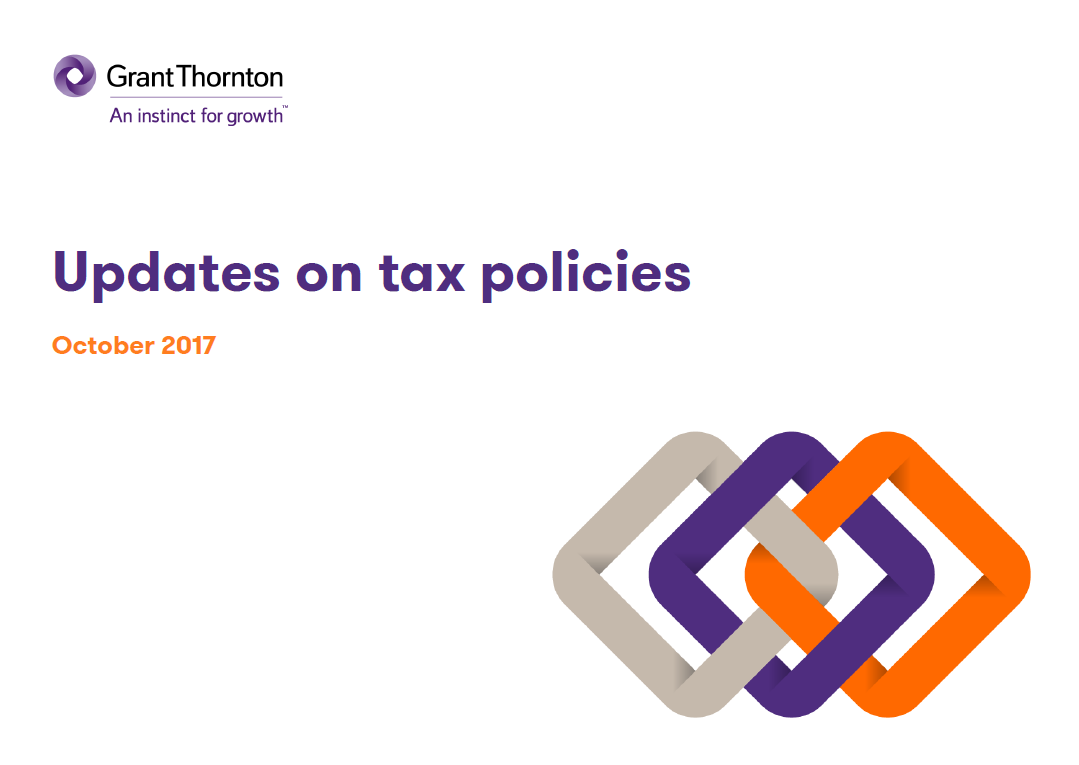-
International Financial Reporting Advisory Services
IFRS reporting advisory serivces of Grant Thornton are carried out by our dedicated team with expertise in IFRS implementation.
-
Audit Services
• Statutory audit • Review of financial statements and financial information • Agreed-upon procedures • FRAS services • Compilation of financial information • Reporting accountant • Cross-border audit • US GAAP audit
-
Audit Quality
We have various methods of monitoring our system of quality control and engagement quality, including real-time involvement of coaches and national office personnel on select audit engagements, reviews of issuer audit engagements prior to archiving by someone outside of the engagement team, and internal inspections of assurance engagements and the system of quality control.
-
Audit Approach
Audit Approach
-
Licensing services
Licensing services
-
International tax planning
Our extensive international network provides us with significant resources to meet all your expansion goals. We strive to develop commercially focused and tailored tax strategies to minimise tax exposures and maximise business efficiency.
-
Expatriate tax planning
We have a broad knowledge base and skills to assist you keep your personal income taxes to a legitimate and reasonable level, while remaining compliant with legislation. We can develop a personalised package for each key employee to take maximum advantage of the exemptions and incentives available.
-
Tax advisory
We will review the proposed business model and transactions and advise on tax implications and recommendations to optimize the tax opportunities under the local regulations and treaties which Vietnam entered into. Furthermore, we coordinate with our GT global tax team to provide a comprehensive tax advisory for the countries involved in the business model and transactions.
-
Tax compliance services
This service is designed to assist enterprises to cope with the statutory tax declaration requirements in line with the Vietnamese tax laws as well as the frequent changes and updates in tax laws.
-
Tax health check
Our Tax Health Check involves a high-level review of specific tax areas to highlight the key issues that need to be rectified in order to reduce tax risks. Through our extensive experience, we have identified key risk areas in which many enterprises are not fully compliant or often overlook potential tax planning opportunities. Our tax health check service represents a cost-effective method to proactively manage risks and reduce potential issues arising as a result of a tax inspection.
-
Transfer Pricing
Transfer pricing is a pervasive tax issue among multinational companies. In Vietnam, the tax authorities require special documentation to report related party transactions. Compliance with transfer pricing regulations is an important aspect of doing business effectively in Vietnam as failure to do so may result in significant penalties.
-
Tax due diligence
We conduct tax due diligence reviews of target companies to analyse their tax exposure and position in relation to acquisitions, mergers or consolidations. We are able to integrate this service with our Advisory Services department in order to offer a comprehensive, holistic due diligence review.
-
Customs and international trade
Our experienced professionals can help you manage customs issues more effectively through valuation planning and making use of available free trade agreements. We also assist Clients in optimising their customs procedures by making use of potential duty exemptions and efficient import-export structures. Risk mitigation activities include customs audit defense and compliance reviews.
-
M&A Transaction
We advise numerous foreign investors on efficient tax structures for their investments. Our experience allows you to consider all the options and set up a corporate structure that meets both operational and tax efficiency requirements. In short, the structure that is best for you.
-
Industrial Zones – Picking A Location For Your Business
Grant Thornton Vietnam’s one-stop services are designed to provide comprehensive support to both new and current investors who are planning to expand or restructure their business in Vietnam. Our professionals have established strong working relationships with landlords, property developers and authorities at various localities. With extensive experiences in liaison with the relevant agencies, we offer assistance including negotiation on land rental rates and efficient management of licensing process. Our customized and flexible solutions can bring benefits of cost efficient location, accelerate licensing process, and optimize tax opportunities while remaining in compliance with legislation.
-
Tax Audit Support
Tax audit support services provide comprehensive assistance to your business in Vietnam. Recent tax practices have shown the general tendency of launching routine tax audit on yearly basis. Tax authorities have been effectively using more sophisticated methods to identify target entities from across different industry sectors.
-
Business Risk Services
Business Risk Services
-
Transaction Advisory Services
Transaction Advisory Services
-
Valuation
Valuation
-
Business consulting services
Finance Management Advisory
-
Accounting services
Accounting services
-
Taxes compliance within outsourcing
Taxes compliance within outsourcing
-
Payroll, personal income tax and labor compliance
Payroll, personal income tax and labor compliance
-
Secondments/Loan staff services
Secondments/Loan staff services
-
Compilation of the financial and non-financial information
Compilation of the financial and non-financial information
-
Accounting systems review and improvement
Accounting systems review and improvement
-
Initial setting-up for accounting and taxes systems
Initial setting-up for accounting and taxes systems
-
Management accounting and analysis
Management accounting and analysis
-
Comprehensive ERP system solution
ERP software is a tool for business operations, production management, order processing and inventory in the business process. Today, ERP software for small and medium businesses has been greatly improved to help businesses manage their business better. The article below will answer all relevant information about what ERP software is and offer the most suitable ERP solution for businesses. Let's follow along!
-
Analyze Business Administration data
We believe in the value that data can bring to the success and development of every business. Our team helps design data architecture supported by tools, to support business governance and provide useful information to management.
-
Financial reporting compliance solution package
Putting financial issues at the heart, this service helps ensure that financial reports for customers comply with both the requirements of Vietnamese accounting regulations and standards (VAS) as well as reporting standards. international finance (IFRS).
-
Third-party ERP extensions
ERP is a long-term solution that requires long-term travel, not short-term. We understand that many businesses cannot deploy the entire ERP system at once due to many different reasons, instead businesses can deploy each part. Over time, these solutions can be expanded to accommodate improved business processes or can even link completely new processes across different departments.
-
Localize, deploy and rebuild the project
Quite a few ERP projects need to be implemented according to current Vietnamese requirements and regulations, but still comply with common international business requirements. These projects need some improvements and adjustments in the right direction.
-
Consulting on technology solutions
We support the selection and implementation of the most suitable solutions, ensuring business efficiency and performance. We will work closely with customers to plan, evaluate and implement the right technology investment strategies and solutions to meet the development needs of businesses.

-
Offshore company establishment service
Using the offshore company model will facilitate the owner in the process of transaction and expand overseas markets, take advantage of the tax policy with many incentives and protect the value of the family enterprise's assets.
-
Private Trust Advisory
The development of the economy with many modern financial instruments has brought many advantages and opportunities for the enterprises, but there are still certain potential risks in any type of business. So how to protect your asset value with an appropriate company structure while stay compliance with relevant regulations?
-
Our values
We have six CLEARR values that underpin our culture and are embedded in everything we do.
-
Learning & development
At Grant Thornton we believe learning and development opportunities help to unlock your potential for growth, allowing you to be at your best every day. And when you are at your best, we are the best at serving our clients
-
Global talent mobility
One of the biggest attractions of a career with Grant Thornton is the opportunity to work on cross-border projects all over the world.
-
Diversity
Diversity helps us meet the demands of a changing world. We value the fact that our people come from all walks of life and that this diversity of experience and perspective makes our organisation stronger as a result.
-
Contact us
Contact us
-
Available positions
Experienced hires
-
Available positions
Available positions
In this newsletter, Grant Thornton Vietnam offers guidance on updates related to tax policies as follows:
1. Reform in administrative procedures for registration and change of VAT calculation methods
The Ministry of Finance – the General Department of Taxation has issued Official Letter No. 4253/TCT-CS dated 20 September 2017 to introduce some new points in Circular 93/2017/TT-BTC as follows:
Determined VAT calculation method will be based on VAT returns submitted by a company to the tax authority, specifically:
- Where a company applies VAT deduction method, Form 01/GTGT and Form 02/GTGT are required for submission to the tax authority;
- Where a company applies VAT direct method, Form 03/GTGT and Form 04/GTGT need to be filed with the tax authority.
This Official Letter also provides guidelines on dispensing with Form 06/GTGT when a newly established company and an operating company with VAT revenue of less than VND 1 billion apply VAT deduction method, and when a company changes its VAT calculation method.
2. VAT obligations of Export Processing Enterprises (EPEs) with export and import rights
On 12 September 2017, the General Department of Taxation issued Official Letter No. 4107/TCT-KK providing detailed guidelines on the management of declaration obligations of EPEs performing export and import procedures as follows:
- For production activities related to export, EPEs are not considered as VAT payers, therefore they are not required to declare VAT to the tax authority for these activities.
- However, in addition to the aforementioned production activities, in case the EPEs are also licensed to conduct trading activities or activities directly related to purchase and sale of goods in Vietnam, these added activities are subject to VAT. The EPEs have to perform tax registration with the local tax authority and maintain separate accounting books to record revenue and expense associated with the purchase and sale of goods in Vietnam, not recording them in the accounting books for production activities. Meanwhile, separate areas must be arranged for storing imported and exported goods in accordance with the import and export rights.
According to our research, the Hanoi Tax Department issued Official Letter No. 45692/CT-HTr dated 8 July 2016 providing detailed guidance for an enterprise to change tax registration information when granted the rights to export and import in Vietnam in accordance with Article 11, Circular 80/2012/TT-BTC which was then amended by Article 12, 13 of Circular 95/2016/TT-BTC. Accordingly, this enterprise must declare and pay VAT in compliance with the regulations on trading activities in Vietnam.
3. Invoice use during the tax debt period enforced by notification of invalid invoice
The General Department of Taxation issued Official Letter No. 4094/TCT-CS dated 11 September 2017 on penalizing administrative violations related to invoices as follows:
In case the taxpayer is in the tax debt period and enforced by “Notification of invalid invoices”, technically, the taxpayer cannot issue invoices. If the taxpayer uses any invoice during this period, such action will be considered illegal.
4. Corporate Income Tax (“CIT”) for dividends received before the investment date and interest income derived from the revenue on sale of securities
The Official Letter No. 4085/TCT-DNL dated 11 September 2017 issued by the Ministry of Finance – the General Department of Taxation provides guidance on CIT on dividend received before the investment date and interest income derived from the revenue on sale of securities as follows:
- In case cash is collected from the sale of securities and deposited at a bank, the interest income is considered as other financial income and not subject to VAT declaration and payment in accordance with Clause 1, Article 5, Circular 219/2013/TT-BTC of the Ministry of Finance. Issuance of VAT invoice for such financial income is unnecessary.
- For dividend received before the investment date, which is recorded as a decrease in investment value, such dividend is exempt from CIT once the right to receive dividend is certified.
5. Transfer Pricing Form for the fiscal year ended after 1 May 2017 (which is the effective date of Decree 20/2017/ND-CP)
One of the vague points of Decree 20/2017/ND-CP (“Decree 20”) and Circular 41/2017/TT-BTC (“Circular 41”) regarding tax management on businesses having related party transaction(s) is the effective date (both regulations have their effective date on 1 May 2017). Currently, based on unofficial exchanges with the tax authorities, it can be interpreted that the application of the new regulations, Decree 20 and Circular 41, is required for enterprises with their fiscal year ended after 1 May 2017.
Accordingly, under this interpretation, enterprises whose fiscal year ended after 1 May 2017 (for example, fiscal year ended 30 June 2017) have to comply with the new regulations in Decree 20 and Circular 41, one of which is to prepare and submit the Transfer Pricing Form (Form 01 – Decree 20) in place of the previous Appendix 03-7/TNDN.
In this regard, Hanoi Tax Department issued Official Letter No. 63347/CT-TTHT dated 21 September 2017 confirming that enterprises with fiscal year ended 30 June 2017 have to conform to the new regulation, which is to prepare and declare Form 01 under the guidance in Decree 20 and Circular 41.
It is noted that up to now, the HTKK software system supporting the declaration, which was developed by the General Department of Taxation, still has not supported the declaration of Form 01. Therefore, in case of applying the new regulations, enterprises have to declare Form 01 in hard copy.
Notwithstanding, we noted that enterprises located outside Hanoi should discuss directly with their local tax authority to confirm the requirements (on the use of Form 01 or Appendix 03-7/TNDN in this case) as the understanding and interpretation of the new regulations may differ for each province.
Please contact our professional advisors at Grant Thornton Vietnam for assistance with taxation, work permits for expatriate and legal issues you may have during the course of your business.






